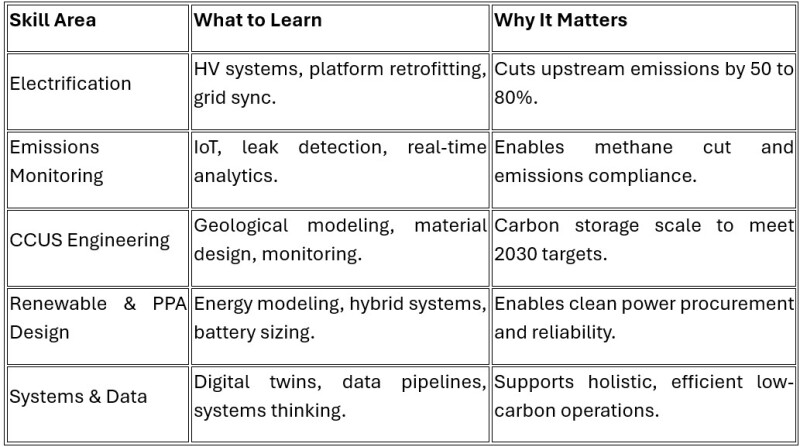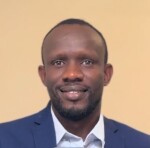"Net zero" is a buzzword not only in corporate boardrooms but also in academic classrooms. As the world moves to achieve a goal of net-zero emissions by 2050, the question for the young professional (YP) is not what it means to be an oil and gas engineer in 2025 but what tools do engineers need to master drilling logs, reservoir simulations, and the physics and chemistry of industrial decarbonization. With climate demands, regulatory mandates, and global decarbonization goals reshaping the sector, engineers must now understand electrification, emissions measurement, carbon capture, renewable integration, and systems-level energy design.
This article explores how YPs can build the competencies needed to support sustainability in oil and gas operations, not just for efficiency but also for climate resilience. Unlike digital optimization initiatives that enhance performance and responsiveness, the strategies described here are directly linked to emission reduction goals, net-zero pathways, and long-term environmental compliance.
Upstream Electrification: Cutting Emissions at the Source
Electrification of offshore platforms with renewable or grid power is one of the more effective methods of reducing emissions intensity. According to Rystad Energy, fully electrified rigs on the Norwegian Continental Shelf produce just 1.2 kg of CO2 per barrel of oil equivalent, compared with 8.4 kg before electrification, an 86% reduction in emissions per barrel.
Partially electrifying with shore power or hybrid generation systems still offers significant emissions reductions, especially in premium energy basins.
Engineering Skills To Build
- High-voltage power distribution, offshore transformer design, and grid synchronization
- Electrical system retrofits for floating and fixed platforms
- Collaboration with power utilities and control systems teams
Emissions Monitoring and Methane Management
Accurately accounting for emissions is the first step toward reducing them. Ernst & Young (EY) analysis shows that major oil and gas operators cut their Scope 1 and 2 emissions by approximately 20% between 2017 and 2020, mainly through sensor deployment and real-time analytics.
The IEA highlights methane leak detection and flaring reduction as key levers for decarbonizing operations. These methods align directly with tightening methane regulations in jurisdictions such as the EU, US, and Canada.
Engineering Skills To Build
- Internet-of-things sensor networks, supervisory control and data acquisition systems, and emissions calibration
- Real-time data analytics for anomaly detection
- Regulatory reporting coordination and environmental compliance
Carbon Capture, Utilization, and Storage (CCUS) and CO2-Enhanced Oil Recovery (EOR)
CCUS is scaling from niche to mainstream. Consider the following:
- Sleipner (Norway)—Injects approximately 1 Mt of CO2 per year into a subterranean saline formation since 1996, monitored by seismic surveillance
- Weyburn-Midale (Canada)—Has stored approximately 40 Mt of CO2 since 2000 through combined CO2-EOR and storage operations
- Gorgon (Australia)—Aims to store 4 Mt of CO2 annually in deep geological reservoirs.
The IEA states that widespread CCUS deployment could cut global oil and gas emission intensity by over 50% by 2030. These efforts support international climate targets such as the Paris Agreement and regional net-zero frameworks.
Engineering Skills To Build
- Geological evaluation and reservoir modeling for CO2 storage sites
- Designing corrosion-resistant wells and CO2-compatible materials
- Monitoring techniques, including seismic, tracer studies, and pressure logging
Renewable Integration Through PPAs
Increasingly, oil and gas companies use power purchase agreements (PPAs) to procure renewable electricity for their operations. These PPAs enable operators to decarbonize energy-intensive processes without depending solely on internal generation. Recent analysis reports that PPAs are becoming key decarbonization tools for operators across Europe and the Americas.
Battery energy storage systems (BESSs) store electrical energy for later use, acting as a buffer between energy generation and consumption. BESSs are becoming vital for smoothing supply fluctuations and maintaining reliability, especially in remote installations.
Engineering Skills To Build
- Modeling energy demand and structuring PPAs
- Designing and optimizing hybrid systems with solar, wind, and battery storage
- Leading cross-disciplinary teams to align renewable sourcing with operations
Roles in CCUS Project Execution
Early career engineers are now stepping into pivotal roles in CCUS deployment. Industry leaders like SLB emphasize that reservoir engineering expertise is central to safe, efficient CO2 injection.
These projects require not just technical skills, but also an understanding of permitting, stakeholder engagement, and carbon finance.
Engineering Skills to Build
- Techno-economic modeling and reservoir screening
- Integrating CO2 injection into existing wells and infrastructure
- Conducting risk assessments for caprock integrity and leak prevention
Systems Engineering and Data-Driven Operations
True low-carbon transformation requires integrated, multivector energy systems. Unlike smart field optimization, which is focused on efficiency, this transformation demands a systemwide view of carbon flows, lifecycle emissions, and energy transition alignment. The IEA asserts that digital twins and real-time analytics are essential for optimizing low-carbon energy systems and emissions in real time.
Engineering Skills To Build
- Digital twin creation using Python, Structured Query Language, and simulation tools
- Systems thinking across mechanical, electrical, geoscience, and software disciplines
- Mastery of analytics pipelines for operational intelligence

Final Thoughts
In 2025, low-carbon operations in oil and gas are foundational not optional. Climate goals, investor expectations, and regulatory pressures demand engineers fluent in electrification, emissions analytics, CCUS, renewables, and digital systems. Whether you are a student, intern, or early-career engineer, now is the time to cultivate these capabilities. Master them, and you will not only participate in the energy transformation but lead it.
For Further Reading
Five Ways Oil and Gas Can Lead the Race to Decarbonization, EY
Emissions from Oil and Gas Operations in Net Zero Transitions, IEA
CCUS in Clean Energy Transitions, IEA
Decarbonization in the Oil and Gas Sector: The Role of Power Purchase Agreements and Renewable Energy Certificates by N. Chrysikopoulos, et al.
UKC Carbon Reduction Plan, EY Foundation

Zainab Iyiola, SPE, is a graduate student at the University of Oklahoma (OU), pursuing dual master’s degrees in petroleum engineering and data science. She graduated top of her class from the University of Mines and Technology in Ghana and was selected as a delegate for the 2022 IPTC Education Week in Saudi Arabia.
Her research focuses on hydrogen energy, carbon capture, storage, and utilization, enhanced oil recovery, and machine learning applications in energy. She is passionate about applying technology to solve real-world energy challenges.
She is a recipient of several honors, including the 2024 Egbert Imomoh SPE Scholarship and the African Energy Chamber Scholarship.

Promise Longe, SPE, is a PhD student in petroleum engineering at the University of Kansas, affiliated with the Tertiary Oil Recovery Program (TORP) Center. His research focuses on reservoir simulation for CO2 enhanced oil recovery (EOR) and micro-continuum modeling for carbon capture and storage and underground hydrogen storage in carbonate reservoirs, with a strong integration of machine learning techniques.
He holds an MSc in petroleum engineering from the University of Kansas and a BSc from the Federal University of Petroleum Resources, Nigeria. An SPE member since 2016, publishing in several high-impact journals and presenting at multiple SPE conferences. Before graduate school, he worked as a reservoir engineer at Laser Engineering and Management Consultants in Port Harcourt, Nigeria, where he gained practical experience in field development planning and reservoir management.

Jane Onu, SPE, is a dual master's student at the Colorado School of Mines, pursuing degrees in petroleum engineering and data science. She is currently a research student with the Fracturing, Acidizing and Stimulation Technology (FAST) Consortium.
She holds a bachelor’s degree in petroleum engineering from Federal University of Technology Owerri Nigeria and is passionate about leveraging data-driven approaches to solve complex challenges in energy systems. Before graduate School, she worked as a projects commissioning engineer for Oilserv Ltd. An SPE member since 2016, she is also actively involved in student leadership and mentoring, committed to helping others navigate the path to graduate education and research.

